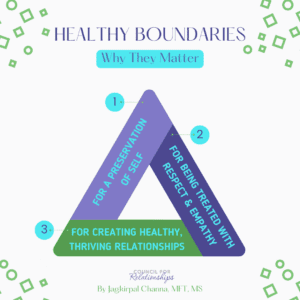Healthy Connections: Setting Boundaries in Relationships
Healthy boundaries are essential to thriving relationships. But what does it mean to set boundaries in a relationship? What makes for healthy connections? How are boundaries in romantic relationships different from non-romantic relationships?
The types of boundaries you set vary because of the relationships you create and maintain. For example, your boundaries with people on social media differ from those with your parents.
The following are just some of the varied boundaries we must set with those in our lives:
- Emotional boundaries
- Financial boundaries
- Personal boundaries
- Physical boundaries
- Sexual boundaries
- Time boundaries
Read on for therapist advice on setting healthy boundaries and identifying when a relationship has poor boundaries.
 What Does it Mean to Set Boundaries in a Relationship?
What Does it Mean to Set Boundaries in a Relationship?
Boundaries are the emotional, physical, and mental limits we set for ourselves in various aspects of our lives. When we set boundaries, we limit who can access our personal and emotional space.
They determine how much others can influence us, use our time and energy, and affect our emotions. Healthy boundaries provide a sense of security and autonomy. They help individuals navigate their relationships with clarity and confidence.
Boundaries are central to the complex dance of human relationships. They serve as the invisible but critical framework that defines the space between individuals.
Boundaries are crucial for healthy connections, personal well-being, and a balanced life. Every relationship needs them to foster safety and security. Understanding boundaries and their importance is critical to managing relationships effectively. To navigate relationships well, you must know when and how to set limits.
Creating and maintaining boundaries is crucial for a fulfilling and well-balanced life. This is particularly true in a world that is constantly demanding time and energy.
Why Boundaries Matter for Healthy Connections
Boundaries are necessary to maintain identity, show respect and understanding, and have healthy connections and thriving relationships.
Preservation of Self
Boundaries act as a protective shield for our well-being. We safeguard our mental and emotional health by clearly defining what is acceptable and what is not. This is particularly crucial in preventing burnout, stress, and the erosion of our identities.
Psychologist Herbert Freudenberger coined the term “burnout” in the 1970s. He used it to describe the impact of excessive stress and lofty ideals, particularly in fields such as healthcare. Overworked doctors and nurses often experience burnout, feeling exhausted and unable to perform their jobs effectively.
Today, the term extends beyond these professions, impacting a broad spectrum of individuals, including career-driven professionals, celebrities, overworked employees, and homemakers. Nowadays, people acknowledge burnout as a widespread issue that affects more than just those in fields such as medicine.
Prevent burnout and maintain your identity at work and personal life by setting healthy limits.
Respect and Empathy
Establishing boundaries is a form of self-respect, encouraging others to respect us. Communicating our limits promotes understanding, empathy, and a healthy relationship exchange. It reinforces the idea that each person is an individual with unique needs and preferences.
Empathy means recognizing, understanding, and sharing the thoughts and feelings of another living being. Empathy is essential for building relationships and showing others respect. Empathy is about seeing things from someone else’s point of view.
Healthy Connections Lead to Thriving Relationships
Boundaries are the cornerstone of healthy relationships. They balance independence and connection, preventing feelings of suffocation or neglect. Respecting boundaries is vital for healthy relationships with friends, family, and partners.
Relationships are at the core of communities. When we have healthy, thriving relationships, our communities flourish. Establishing healthy boundaries sets a positive example for others and strengthens the bonds of our communities.
When to Set Boundaries
You can always establish or change new boundaries, regardless of where you are in a relationship. However, there are beneficial times when healthy boundary setting is critical. Those times are at the onset of a new relationship, during times of increased stress or change, and when you feel overwhelmed.
At the Beginning of a Relationship
Establishing boundaries early on sets the tone for a healthy connections. Communicating your expectations and limits helps prevent misconceptions and ensures that both parties are on the same page. Misconceptions arising from misunderstood or unknown boundaries are common ingredients in unhealthy relationships.
As you will read, clear, consistent communication about boundaries is important in all relationships.
During Times of Stress or Change
These are stressful times, with constant demands on our time from family, friends, Zoom meetings, etc. Then there are the random elements of life: suddenly needing to care for a sick loved one or losing your job. Life’s challenges test our limits.
It is crucial to reassess and potentially adjust boundaries during heightened stress or significant life changes. This adaptive approach allows for the flexibility needed to navigate life’s complexities.
When Feeling Overwhelmed
How to Effectively Set & Maintain Boundaries & Healthy Connections
You can effectively set healthy boundaries in relationships using four skills. Skills to establish healthy connections include self-reflection, clear communication, consistency, and learning to say “no.” At all stages of a relationship, paying attention to how you use these skills is important.
Self-Reflection
Begin by understanding your own needs, values, and limits. Reflect on what makes you comfortable or uncomfortable in different situations. This self-awareness will help you set boundaries that align with your well-being.
Try some of the following activities to get yourself in a self-reflective mood:
- Journaling
- Go for a walk
- Meditate
- Identify your values, strengths, and goals
Clear Communication
Articulate your boundaries clearly and assertively. Use “I” statements to express your needs and feelings without assigning blame. Be direct yet respectful, creating an open space for honest communication.
Consistency is Key to Healthy Connections
Consistency is crucial in maintaining boundaries. Uphold your limits consistently, reinforcing the message that your boundaries are not negotiable. This consistency builds trust and reinforces others’ respect for your needs.
Learn to Say “No”
Expressing a negative response or saying “no” is a potent tool for establishing boundaries. When you say “no,” you declare your limits and affirm your priorities. Learning to say no with tact and kindness empowers you to protect your time and energy.
About the Author of “Healthy Connections:Setting Boundaries in Relationships”
Jagkirpal Channa, MFT, MS, is a Pennsylvania therapist accepting new clients and referrals online and in person. If you or a family member or friend could benefit from therapy, click here to request an appointment. You may also contact Jagkirpal if you have questions about setting limits and establishing healthy relationship boundaries.
See our Therapist & Psychologist Directory to find a different CFR therapist or psychiatrist near you.
More from CFR
CFR has so much more for you to explore from our expert therapists, psychologists, and psychiatrists. Visit the CFR Expert Voices blog for excellent mental health tips. You can find advice on building healthy connections. This includes setting personal and sexual boundaries. You can also learn about boundaries at work. Additionally, you can spot red flags in relationships and more. Sign up for our newsletter to be the first to get new expert mental health blogs in your inbox. Here are several recent blogs that we believe you will find enjoyable.
Pennsylvania Therapist Accepting New Clients: Jagkirpal Channa
How Do Couples Navigate Their Safety When One Partner Returns to Work?

